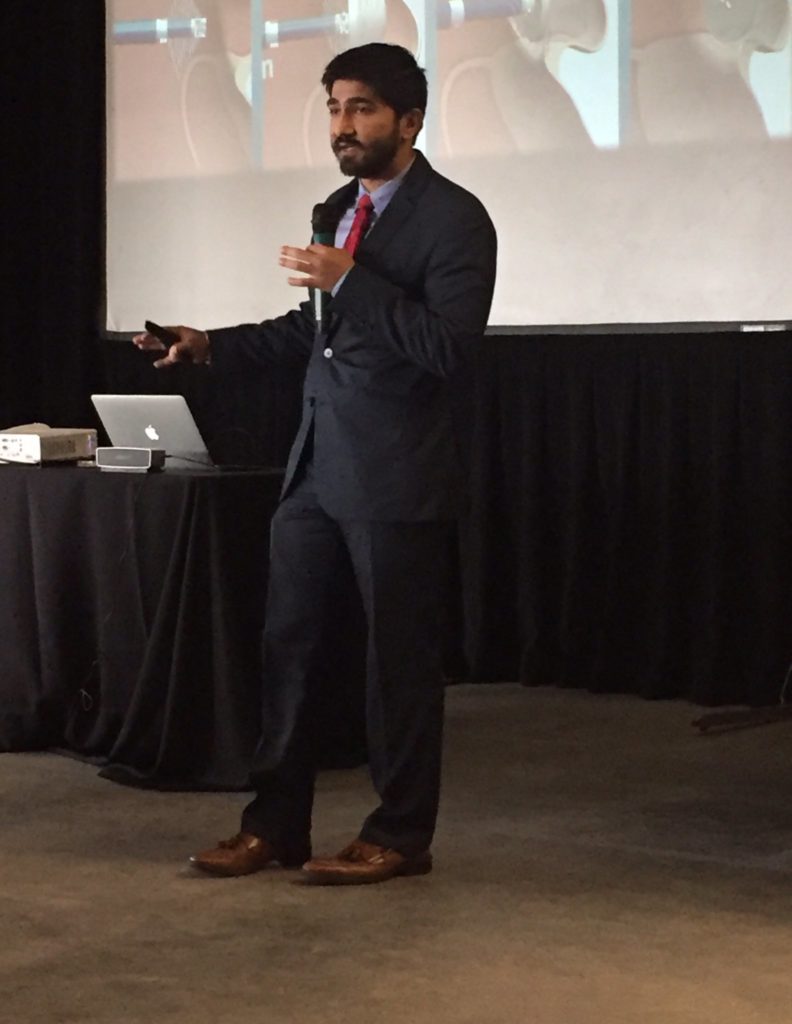
We provide a heart implant device to prevent strokes in atrial fibrillation patients.
Name: Flow MedTech, Inc.
Location: Dallas, TX (HQ), Columbia, SC (SC Office)

Arnab Chakraborty, Co-founder

Christine Hang, Co-founder
Website: flow-medtech.com
Product / Service Offering: Heart implant device to prevent strokes in atrial fibrillation patients
Co-founder Interviewed: Arnab Chakraborty, Co-founder, Chairman & Chief Product Officer
Other Key Management Team Members: Christine Hang, Co-founder & CEO
This article is part of our Business Startup Spotlight series featuring entrepreneurs and their companies. We hope that these founders’ interviews will inspire and motivate you as you undertake your own entrepreneurial journey.
Tell us a little about yourself with a focus on what motivates you?
Hello! I am Arnab Chakraborty, the Chairman, Chief Product Officer, and cofounder for Flow MedTech. I have been working full time with Flow MedTech since I graduated from Georgia Tech’s Biomedical Engineering program in 2013. My notable experience while at Georgia Tech (GT) was conducting research as a part of Dr. Ajit Yoganathan’s Cardiovascular Fluid Mechanics research group, a pioneering lab studying the function and mechanics of heart valves and other complex cardiac defects.
My focus and motivation has always been based on helping people. I initially thought the best way to help people was to be a physician. Cardiac surgery was my primary interest. I was a pre-med student; however, through GT’s engineering program, I found that I really loved creating and building medical devices. During my senior year, I was introduced to the world of startups, specifically through Georgia Tech’s VentureLab incubator. I discovered that I could create a startup company based on the project I was doing for senior design. It was tough giving up the path to pursue medicine, but I realized I could help more people by creating a medical device that could be sold internationally.
When did you establish your company and where did the idea originate?
Flow MedTech was established in 2014 in Atlanta, GA. The idea to create our technology was based off a Capstone senior design project while at Georgia Tech in 2013. Our senior design team created a customizable implant technology to help children born with a heart defect known as an atrial septal defect, or a hole between the top two chambers of the heart. My co-founder, Christine Hang, was a part of that senior design project. We both loved what we were doing so we decided to keep working on the project after the class was over. While doing our customer discovery to make sure we could create a company around the technology, we found that despite the love and praise we had received for our senior design technology, the pediatric market was, unfortunately, too small to pursue for a startup.
Around November 2013, we met one of our current advisors, Dr. Gautam Kumar, who said our technology could be better suited as a solution to prevent strokes in atrial fibrillation patients. Subsequently, we did our customer discovery for the left atrial appendage closure market and ended up forming Flow MedTech in 2014.
What need or needs does your company seek to fill for its customers?
Nearly 800,000 Americans suffer from strokes every year. Of these strokes, about a fifth (~160,000) are caused by atrial fibrillation (an irregular heart beat), even with existing stroke prevention therapies for these patients. Furthermore, atrial fibrillation (AF) strokes have an unacceptable mortality of 20%. Because the heart does not beat properly during atrial fibrillation, there’s a pouch off the left side that becomes a breeding ground for clot formation. This pouch is called the left atrial appendage (LAA). The clots escape this pouch and travel to the brain, causing a stroke. Research has shown that nearly 90% of the clots in the brain can be traced to the LAA. Consequently, AF patients are five times more likely to have a stroke.
Typically, an AF patient is prescribed blood thinning drugs to reduce the high risk of stroke. Despite their high stroke risk, nearly 50% of patients do not take their medication due to adverse side effects, such as bleeding risks and drug interactions.
Flow MedTech has invested in a non-drug alternative solution to create a targeted solution to prevent strokes. We have developed a permanent implantable balloon device that inflates inside and conforms to an individual’s uniquely shaped left atrial appendage, thereby blocking it off, preventing clot formations, and reducing the high risk of stroke.
What is the one thing that sets your company apart from its competitors?
Our only true FDA approved competitor is a metal device with a rigid shape that hooks into the LAA, which is composed of soft and delicate heart tissue. In contrast, our solution is a vast improvement as we have created a customizable polymer medical device that conforms to the uniquely sized and shaped LAA to create better closure, effectively blocking it off and preventing clots from escaping to cause stroke. Our device and delivery system has been praised by physicians who believe there is a great need for improvement over first generation devices.
What was the biggest challenge you faced while getting your company up and running, and how did you overcome it?
As a first-time entrepreneur, there was a lot to learn in creating and founding Flow MedTech. We had to make sure there was a legitimate problem and market to pursue. We had to learn about LLCs versus C-Corps. We had to learn about IP strategy. We had to learn the Class III medical device regulatory and reimbursement pathways. We had to learn about the costs associated with all that. However, since early-on we have focused on bringing aboard experienced and valuable advisors to help educate and guide us through our journey.
Are there resources you have utilized that other founders might find compelling or useful?
The best resource is a good team, which includes good advisors. It really helps to have experienced individuals and experts in your industry help guide you through difficult situations.
We also found that industry conferences and trade shows are extremely useful as they helped us expand our network by meeting potential investors, medical device regulatory/reimbursement professionals, and helped connect us with medical device development resources.

What steps have you taken to secure funding for your company and what, if anything, would you do differently if you had to start over?
Aside from self-funding, we won GT Ideas2Serve Advance Track competition, went through Health Wildcatters’ amazing accelerator program, and raised angel investment.
< see related: Startup Accelerator Spotlight: Health Wildcatters >
I am very pleased with Flow MedTech’s accomplishments thus far, and I am looking forward to exciting new challenges moving forward! There may be a few small things I would do differently, but I try to live a “no regrets” and a “everything happens for a reason” type of lifestyle. Founding Flow MedTech has been an amazing experience, and I have appreciated our successes. I also appreciate our failures as I have learned from them. I would not want to change these things because they have brought us to where we are today.
Is Your Startup Investable? Take the Test and Find Out Now!
Have there been any questions you have had as an entrepreneur of a fledgling startup that you had a particularly hard time finding the answers to?
There have been plenty of questions! The questions ranged from how do we make sure our device will work to how does reimbursement in hospitals work to what is the best way to fundraise. I believe it is important to keep an open mind when seeking these answers or feedback on the challenges that you face. Having great mentors who are always an email or text away has been super helpful!
< see related: An Advisory Board: 7 Reasons They are Critical to the Scalable Startup >
What challenges, if any, are you grappling with?
Creating a Class III medical device is tough, because it can become costly. We must make sure we follow FDA’s regulatory process as well as the European regulatory process for international sales. It has been challenging creating a business strategy that is cash and time efficient, but I believe our team has done an excellent job developing creative ways to create our left atrial appendage closure device.
What is the most helpful tip or “hack” you’ve ever learned, stumbled across, or been given?
There are a few; Dream big, keep an open mind, do not be offended by criticism, and be coachable. Also, do not be afraid to fail! You can learn and grow a lot from your failures.

Is there anything else you would like to share about your company?
I am very excited about Flow MedTech’s future. We have been very fortunate with all the praise and support we have received for our work! Flow MedTech’s accolades include being the winner of the 2014 GT Ideas to Serve Advanced Track Competition, both founders nominated as finalists of the GT Biomedical Engineering Outstanding Entrepreneurial Award, semifinalist of the GT Startup Competition, and the 2012 and 2014 semifinalist of the GT InVenture Prize. We have presented the company at various health conferences nationally, including being Johnson & Johnson’s sponsored presenting company at the 2014 AdvaMed National Health Conference. Most recently, Flow MedTech was one of the top five finalists out of nearly 300 international companies for the 2016 Universal Biotech Innovation Prize.
Interested in Startup Stories? Check out our Women Entrepreneurs Spotlight and our Business Startup Spotlight.
Are you familiar with other startups you believe should be spotlighted? If so, we would like to hear from you. Tell us about them, sharing your comments below!








